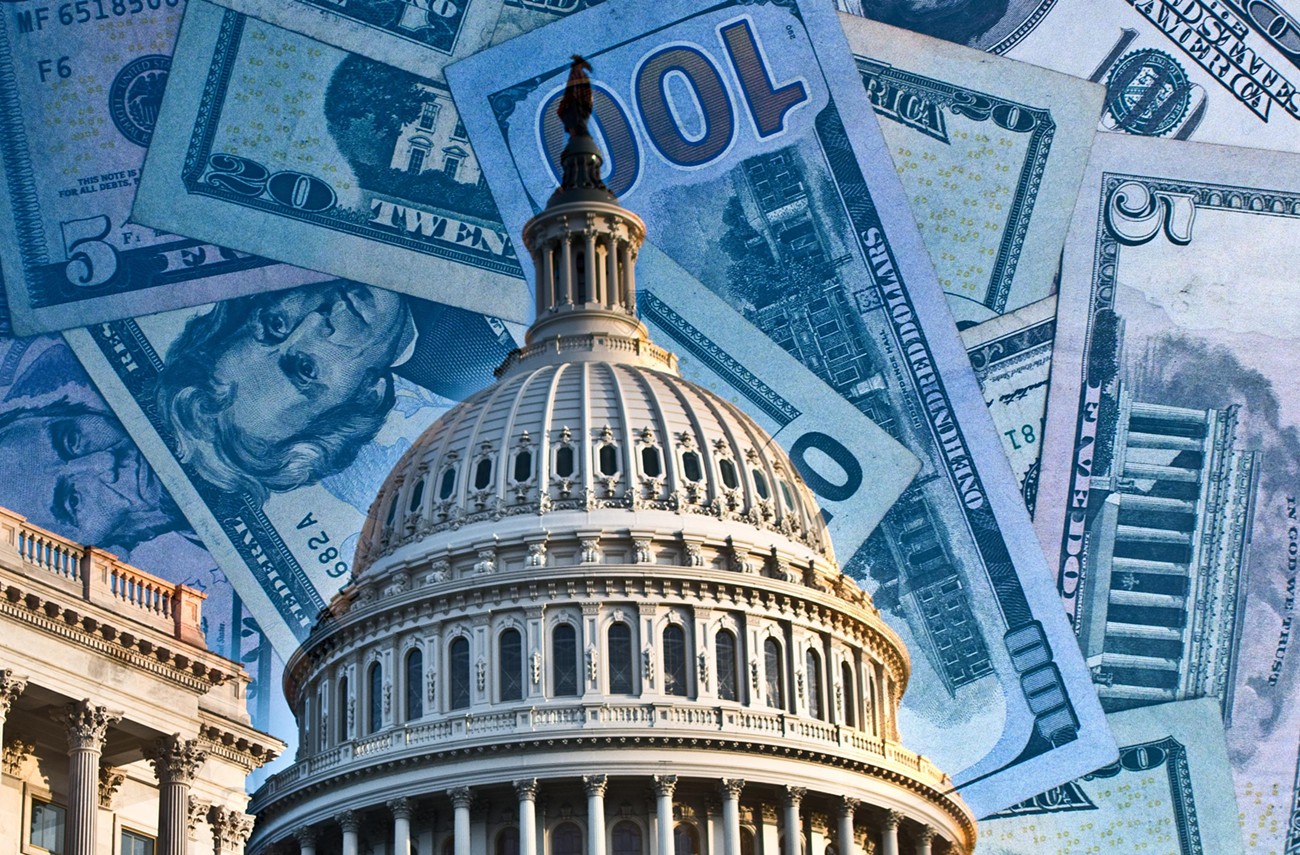Kevin Foster contributed to this story.
Over the past two weeks, it’s become clear that Maxine Dexter’s campaign to represent Oregon’s 3rd Congressional District in the United States House has been the beneficiary of millions in donations from political action committees (PACs) with unknown contributors.
Dexter’s campaign has also received hundreds of thousands of dollars in recent contributions from individual, out-of-state donors—many of whom have donated to Republican candidates and pro-Israel groups in the past. Millions in PAC money has gone toward mailer ads attacking Susheela Jayapal, Dexter’s top opponent in the race.
Jayapal and Eddy Morales, another candidate in the race, have both spoken out strongly against the recent flood of donations. Jayapal and Morales—along with dozens of Portland voters—say Dexter hasn’t condemned the dark money spending strongly enough.

While Dexter has continued to tout her progressive stances, opponents have also suggested that the wave of donations—and even more, who they originate from—show she is more conservative than she lets on. They also worry if Dexter wins, dark money PACs and conservative groups would feel more comfortable getting involved in Portland races in the future.
The influx of last-minute, outside spending has changed the dynamics of the race in a firmly blue district where voters aren’t used to this kind of national attention and money. But with the election only days away, it remains to be seen how voters will respond to the news.
Shady donors
Last week, the Mercury reported on claims that the super PAC 314 Action Fund—a mega-donor to Dexter’s campaign—has been serving as a front for the American Israel Public Affairs Committee (AIPAC) to get involved in the race for Oregon’s 3rd Congressional District. The fund, formed in 2016 to help elect “pro-science” Democrats to public office, is one of two super PACs contributing to the 3rd District race. The other group, Voters for Responsive Government (VRG), is much newer and more opaque, having only formed in April.
As of May 16, 314 Action has contributed $2,212,990 to Dexter’s campaign. VRG has spent $2,407,665 exclusively targeting Jayapal.
A May 3 story in the Intercept first connected 314 Action with AIPAC, based primarily on testimony from two anonymous Democrats in Congress. In a follow-up story in the Intercept, an anonymous 314 staffer said the PAC has “turned its back on science in order to be used as a weapon against progressives by Zionists.”
The 314 PAC cast doubt on the outlet’s sources, writing in a social media post that the stories were made up “out of thin air.” The PAC says their connection to Dexter is clear: She’s a doctor, and they’ve supported her since she first ran for the Oregon legislature in 2020. In fact, Dexter said in a May 3 KGW debate that 314 “recruited her” to run for the Oregon House four years ago.
The science background of other candidates 314 has endorsed in this election cycle, however, is more tenuous. For example, 314 has spent $473,514 on Janelle Bynum’s campaign in Oregon’s 5th Congressional District. Bynum has an engineering background, but received a Master’s in Business Administration and calls herself a “small business owner.”
Jayapal and Morales say Dexter’s campaign has been the recipient of millions of dollars from “MAGA Republicans,” suggesting 314 Action and VRG are funded by far-right donors. Dexter’s campaign has firmly refuted this, saying Jayapal and Morales’s “attacks fall apart at the first hint of scrutiny.”
Dexter’s campaign has also called Jayapal and Morales “hypocritical” for their condemnation of the dark money donations, considering they have also accepted PAC money. But PAC contributions to their campaigns have been much less significant in comparison: Jayapal received $150,000 in donations from the Indian American Impact Fund, and Morales received $58,500 from the National Association of Realtors, which has given mostly to Republican candidates during the current election cycle.
The super PACs aren’t required to reveal their recent donors until Monday—the day before the May 21 election—so the political affiliation of the PAC donors is currently unknown. However, campaign finance documents show Dexter’s campaign has received thousands in individual contributions from people who have also donated to pro-Israel PACs including AIPAC, Republican politicians including Nikki Haley and Ted Cruz, or both.
Larry Mizel, a Denver-based business executive and philanthropist, contributed $3,300 (the maximum donation) to Dexter’s campaign during a single-day fundraising spree on May 7. That day, Mizel's campaign raked in more than $200,000—almost half of which was donated by people who have previously given to AIPAC or other pro-Israel PACs. Mizel, a longtime Republican big spender, was a campaign finance chair for Donald Trump’s 2016 campaign, and donated hundreds of thousands toward Trump’s campaign in both 2016 and 2020.
In a statement to the Mercury, Jayapal’s campaign manager, Andrea Cervone, spoke out against the conservative donors.
"We now know based on Maxine’s own FEC reports that she has been accepting money from the same people who have given millions of dollars to the likes of Donald Trump, Tom Cotton, Ted Cruz, Mike Johnson, Mitch McConnell and even George Santos,” Cervone wrote. “These donors and the agendas they support, agendas that are anti-choice, anti-LGBTQIA+, and anti-climate, are in complete contrast to the progressive values of Oregon’s 3rd Congressional District, and what [current District 3 representative] Earl Blumenauer has embodied.”
Dexter has been a proponent of abortion access, LGBTQ+ rights, strong climate action, and more liberal causes—which doesn’t seem to make her the ideal candidate for major rightwing donors to support. While Jayapal has been more outspoken than any other candidate about her stance on Israel’s war in Gaza, calling for a cease-fire back in November, Dexter’s message hasn’t been too far off. At the very least, she hasn’t publicly expressed the kind of gung-ho support for Israel you might expect from someone receiving this much money from AIPAC-aligned donors.
“I urgently want to see an end to the fighting and achieve long-term peace in Israel and Gaza through a negotiated cease-fire that ensures: (1) an end to the violence, (2) the immediate release of the remaining hostages, and (3) the immediate delivery of much-needed humanitarian aid, including food, water and medicine into Gaza,” Dexter told the Mercury in April, responding to our endorsement questionnaire. “U.S. aid, by law, is tied to strict humanitarian requirements and I would call on President Biden to ensure U.S. law is followed to the letter.”
Dexter was endorsed by advocacy and lobbying group Pro-Israel America, which said she “believes Israel has a right to defend itself, by itself,” is “against the [boycott, divest, sanction] movement,” and “feels Iran poses an existential threat to Israel and a direct threat to America’s national security.” But it’s unclear where—or if—Dexter made statements confirming those beliefs.
"Who is going to represent us?"
Dexter has spoken in favor of campaign finance reform, including after the flood of dark money spending was revealed. Dexter said she didn’t solicit the PAC donations and in the KGW debate, she said she “wasn’t condoning” the wave of dark money donations. She also said she wants to “take care of campaign finance reform…[and] change the laws.” While voters have called on her to more strongly denounce the donations, Dexter’s campaign has kept its focus on her political credentials.
“Maxine Dexter is the only progressive in this race who has actually worked with others and delivered on our values,” Nathan Clark, Dexter’s campaign manager, wrote in a statement to the Mercury. “Maxine is immensely proud of the broad and diverse coalition of progressive support that is powering her campaign, including Oregon labor unions, gun violence prevention advocates, and dozens of Democratic elected leaders who know that in Congress, Maxine will work with others to actually improve lives.”
On Wednesday, the Dexter campaign released a “state of the race” report outlining how “Maxine Dexter is the strongest candidate in the race.” One of the metrics the report cited was fundraising numbers—Dexter’s campaign raised “more than what her two closest opponents…reported raising combined.”
Her opponents haven’t disputed Dexter’s strong fundraising numbers—they just say it comes with baggage.
“The most important issue is that this district election is being bought by two outside dark money groups. Democratic voters in this district need to be aware of that. It’s misleading, it’s cynical, and it flies in the face of Democracy,” Morales said during the KGW debate. “This election should be decided by [people in the district]...not by rich people who are connected and know how to use these vehicles.”
Several of Dexter’s congressional colleagues also wrote a letter in support of her, saying they “refuse to stand by and allow…Dexter’s integrity and rock-solid progressive values to be questioned,” adding that “the idea that she would ever do the bidding of any group or special interest is offensive and wrong.”
“We have all worked directly with Dr. Maxine Dexter. We know she is a person of enormous integrity. She is an effective advocate for this community and always will be. We’ve seen firsthand how Maxine looks at the science, dives into the facts, and works with others to get things done,” the letter states. “We condemn these attacks on her character and we are proud to stand together to vouch for her integrity.”
But for those concerned about the impact of outside spending on elections, none of these statements are enough. Voters are concerned that if Dexter wins, similar spending campaigns will become the norm in Portland.
Jonathan Tasini, a long-time political strategist who is currently running for Portland City Council, told the Mercury he believes the “connection to the AIPAC money really raises the question: Who is going to represent us?”
“What are the politics going to look like for the next 20 or 30 years?” Tasini said. “I don’t want the influence of that kind of money with that kind of political bent [in this seat.]”
Whoever wins Tuesday’s Democratic primary will effectively win the general election for the US House seat, considering how liberal the district is. The super PACs, 314 Action and VRG, are required to disclose their donors by Monday.




















